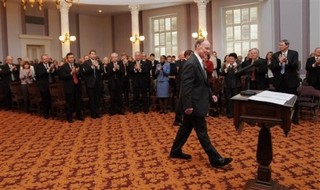On Martin Luther King Jr. Day, the governor of Alabama, Robert Bentley, gave a speech from the pulpit of the Dexter Avenue Baptist Church, the pulpit which once belonged to King. That was his first mistake. Few public figures have blended language religious and political with King’s skill, and Bentley is not among them. This became obvious with his second mistake: when he said, “So anybody here today who has not accepted Jesus Christ as their savior, I'm telling you, you're not my brother and you're not my sister, and I want to be your brother.”
Bentley’s comments drew complaints. On Salon, Justin Elliott called Bentley’s words “oddly exclusionary” and compared them to former Mississippi governor Kirk Fordice’s 1992 declaration that the United States is a Christian nation. Placed in the context of Bentley’s broader remarks, however, such a politicized reading of his words seems strange. They came in the midst of an address in which the new governor celebrated and sought to claim King’s mantle of color-blindness; he also stated that though he was elected as a Republican he would be “the governor of all the people.” It doesn't make sense that he would suddenly pivot from such pleasing bromides to embrace divisiveness and exclusion. Indeed, it seems politically suicidal.
So if it didn't make sense as political rhetoric, what was it? Looked at it another way, Robert Bentley was simply repeating common evangelical doctrine; evangelicals, those Protestants who insist upon the importance of being “born again” use such familial language to refer to other members of their spiritual community. That is, for a moment, Bentley was not speaking the language of politics, but the language of evangelical Protestantism, not as a politician, but a pastor of a faith whose theological rhetoric frequently bears little resemblance to the language of contemporary American politics.
Read Full Article »



